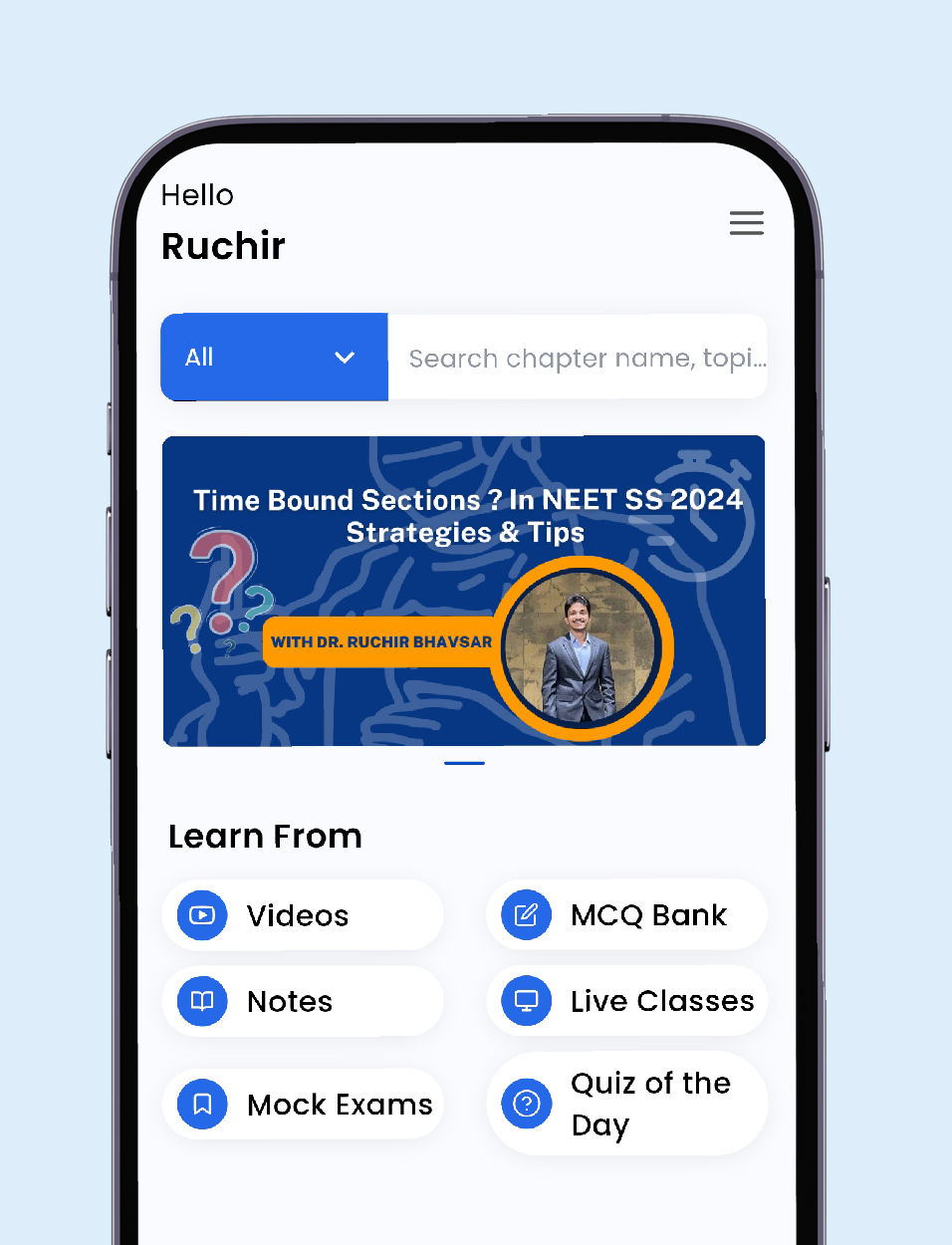By: Dr. Ruchir Bhavsar
The NEET SS exam is a challenging journey, and each mock exam in Decathalon V Mock Exam Series provides you with more than just a score. By diving deep into the analytics provided for each mock, you can pinpoint strengths, identify improvement areas, and strategically prepare for the real exam. Here’s how to use these analytics to maximize your performance.
1. Overview of Your Decathalon V Mock Exam Analytics
Each mock exam provides a comprehensive report covering:
- Total Marks: Your overall score.
- Correct, Incorrect, and Skipped Questions: A breakdown of your attempts.
- Predictive NEET SS Ranking: An predicted rank based on your performance.
- Topic-Wise Insights: An analysis of your performance across various topics.
- Guess Question Analytics: Insights into the effectiveness of your guesses.
- Answer Evolution: Tracks how many answers you changed from correct to incorrect and vice versa.
- Top 3 Strong and Weak Topics: Identifies your best and most challenging areas.
- Time Analytics per Question: Shows how long you took on each question, aiming for an ideal 45 seconds per question.
- Comparison with Rank 1: Benchmarks your performance against the top scorer for insights.
- Series-Wide Analytics: Tracks trends and patterns over multiple exams for continuous improvement.
Each of these metrics reveals specific insights that, if used effectively, can lead to a measurable improvement in your scores. Let’s explore how.
2. Setting Realistic Benchmarks with Total Marks and Predictive Ranking
- Understand Your Position: Your total marks give you an overview of where you stand. Compare your marks to the predictive NEET SS ranking to see your estimated rank in the competitive pool.
- Set Goals: Use this predictive rank as a benchmark to push yourself in the next exam. Aim for incremental improvement, like boosting your score by 15-20 marks per test.
- Adjust Strategies Accordingly: If your rank falls within the top 10, focus on minimizing minor errors and maximizing accuracy. If you’re aiming to break into the top 10, emphasize mastering high-weightage topics.
3. Analyzing Correct, Incorrect, and Skipped Questions
- Prioritize Review: Start by reviewing incorrect answers and skipped questions. Assess why you missed each one—was it due to lack of knowledge, misunderstanding the question, or running out of time?
- Pattern Recognition: Look for patterns. If you consistently skip questions in a particular topic, allocate more revision time to strengthen that area.
- Minimize Negative Marking: Avoid guesses unless you’re certain of a 50% chance of being correct. Tracking incorrect answers helps you refine this approach over time.
4. Using Topic-Wise Insights for Targeted Study
- Identify Strengths and Weaknesses: The topic-wise insights show where you excel and where you need improvement. Use the “top 3 performing strong topics” to recognize areas where you can confidently gain marks.
- Focus on Weak Areas: For weaker topics, dedicate extra study sessions to strengthen understanding and practice. Regularly review and retest yourself on these areas in upcoming mock exams.
- Balance Your Prep: While improving weaknesses, don’t neglect strong areas. Regularly revise them to keep them polished and ready for the exam.
5. Guess Question Analytics: Fine-Tune Your Instincts
- Learn from Guesses: Look at the questions you guessed correctly versus incorrectly. If your guesses are often wrong, focus on either skipping entirely or improving your elimination skills.
- Strategize for Guesses: Based on analytics, use educated guessing in topics where you’re more accurate. This can maximize your score without risking high negative marks.
6. Answer Evolution: Track and Improve Decision-Making
- Track Changes: Analytics on answer changes (correct to incorrect or vice versa) provide insights into your decision-making under pressure.
- Identify Patterns: If you frequently switch from correct to incorrect, consider reviewing your approach. Trust your first instinct and stick to them and dont change that.
- Refine Your Strategy: Use answer evolution data to build consistency in your responses, especially in high-stakes scenarios where second-guessing can lower scores.
7. Leveraging Time Analytics: Optimizing Speed and Accuracy
- Set a Time Goal: For 150 questions in 150 minutes, target an average of 45 seconds per question. That will give you buffer time of > 30 mins for revision or coming back to Marked for Review Q. The time analytics per question shows if you’re on track or spending too long on certain types of questions.
- Create a Buffer: Aim to complete questions within 45 seconds to create a time buffer. This buffer allows for review at the end or handling unexpected challenging questions.
- Balance Speed with Accuracy: If you rush through questions but compromise on accuracy, slow down. If you’re too slow, practice quick recall and time-bound mock tests to pick up speed.
8. Benchmarking with Rank 1: Learn from the Best
- Analyze the Top Performers: The comparison with Rank 1 offers insights into areas where you lag compared to top scorers. This can include speed, accuracy, or question selection strategy.
- Adjust Your Prep Strategy: Use this benchmark to refine areas such as timing, precision in high-weight topics, and accuracy in challenging sections. Treat it as a roadmap for closing the gap.
9. Series-Wide Analytics: Tracking Long-Term Progress
- Measure Improvement Over Time: Series-wide analytics track trends across multiple exams, showing your overall trajectory. Look for consistent improvement, especially in weaker areas.
- Set Milestones: With each mock, set incremental goals—like improving by 15 marks or increasing correct responses by 20%. Series-wide trends help validate these goals.
- Refine Based on Trends: Use analytics to identify fluctuating topics or strategies. If a particular approach isn’t yielding results, consider a change in study technique, like revisiting foundation concepts or testing under timed conditions.
10. Maximizing Your Revision Strategy with Mock Analytics
- Plan Efficient Revisions: Use insights on incorrect and skipped questions to streamline your revision. Allocate more time to frequently missed questions and topics that have low accuracy.
- Practice with Purpose: Apply learnings from each mock to your revision sessions. For example, if you struggle with time management, incorporate timed practice sessions.
- Stay Consistent: With a structured revision plan based on analytics, you can make consistent progress without feeling overwhelmed.
Final Thoughts
Decathalon V Mock Exam analytics offer you an invaluable tool to tailor your NEET SS preparation journey. By consistently applying these insights, you can transform weaknesses into strengths, sharpen your test-taking strategy, and approach the actual exam with confidence and precision. Remember, the path to success in NEET SS lies not just in taking mock exams but in learning from each one to become a stronger, more strategic test-taker.
Good luck, and make the most of your mock exam analytics to reach your goal!







